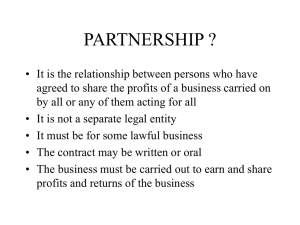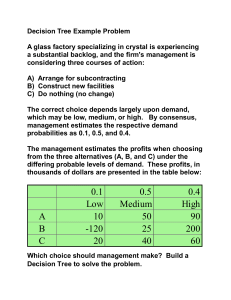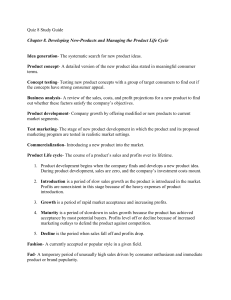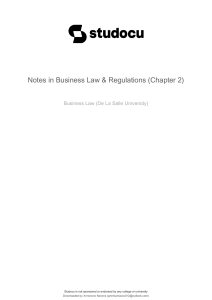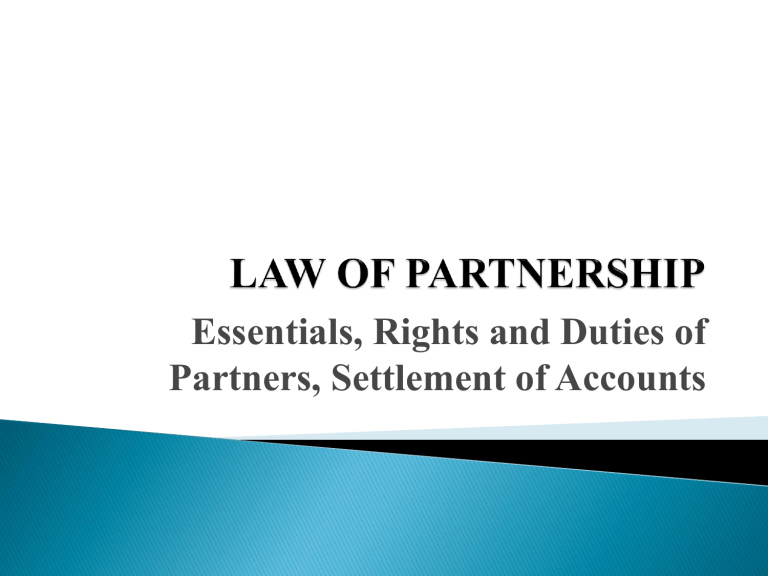
Essentials, Rights and Duties of Partners, Settlement of Accounts Definition: Partnership Act , 1932 (Sec. 3 ) A partnership is a voluntary association of two or more persons, who contribute, money, property, time, care or skill, to carry on, as coowners, a lawful business for profit and to share the profits and losses of the business. 1. Agreement: A partnership is the result of an agreement between persons who want to form a partnership. An agreement may be written or oral. 2. Number of partners: According to section 14 of company’s ordinance, 1984 a partnership consisting of more than 20 persons for carrying on any business is illegal. 3. Existence of business: The partners must agree to carry on a business. If the purpose is to carry on some charitable work, it will not be a partnership. 4. Sharing of profits: The agreement between the parties must be to share the profits of a business. The profit will be distributed among the partners according to their agreement. 5. Duration: The partnership continues at the will of the partners. It comes to an end if any of the partners retires, dies or becomes insolvent. However, if the remaining partners agree to continue the business, the firm will not dissolve. 1. Active partner: A partner who takes an active part in the management of the firm is called active partner. 2. Sleeping partner: One who does not take an active part in the management of the firm is called sleeping. 3. Nominal partner: One who lends his name and reputation to the firm is called nominal partner. He does not invest in business. He does not get share in profits. But, he is regarded as partner in the eye of law. He is liable to the outsiders for the debts of the firm. 4. Senior partner: A partner who has made more investment in the firm and receives more profit is called a senior partner. 5. Junior partner: A junior partner is the one who has a small investment in the business and receives a nominal share in the profits. 6. Partner in profits only: He is a partner who shares the profits of the firm but is not liable for the losses. But he is equally liable as other partners to the outsiders. 1. Partnership at will: Where no provision is made in the contract regarding the duration of partnership. 2. Particular partnership: Where partnership is formed to do a particular business. Such partnership is dissolved immediately after the completion of that business. 1. Right to take part in business: It is not essential for every partner to take part in business but the right of participation should be available to every partner. 2. Right to inspect books. Every partner has rights to inspect an take copies of books of the firm. 3. Right to share profits. Every partner has rights to share equally in profit earned and is liable to contribute equally to losses suffered by the firm . 4. Right to give consent. Every partner has rights to prevent the introduction of new partner unless he consents to that . 5. Right to retire: A partner can retire with the consent of other partners or according to the agreement or by giving notice to all the partners. 1. Duty to carry on Business: It is the duty of every partner to carry on the business of the firm for the common advantage. 2. Duty to be just and faithful: The partners should be faithful and just towards the firm and towards other partners in their actions specifically in maintaining the firm’s accounts. 3. Duty to indemnify: Every partner is bound to indemnify the firm for any loss caused to it by his conduct like fraud or misrepresentation. 4. Duty to share losses : Every partner shall bear the losses equally borne by the firm irrespective of their capital contribution . 1. A firm may be dissolved with the consent of the partners. 2. A firm is compulsorily dissolved if all the partners except one, become insolvent 3. If a firm is constituted for a certain term, then it stands dissolved after the expiry of the term. 4. A firm may be dissolved by the order of the court if any of the partners files a suit for the same on any of the following grounds: a. A partner has become of unsound mind. b. A partner has become insolvent c. A partner has committed breach d. The firm is running on losses 5. Where the partnership is at will, any partner giving notice in writing to all the other partners may dissolve the firm. 1. The partners shall pay losses, first from their profits, next out of capital and lastly if necessary by the partners individually according to the proportion of their expected profits. 2. The assets of the firm shall be applied to pay the debts of third parties, to pay each partner what is due to him, the rest if any to be divided among the partners according to the proportion in which they were to receive profits. 1. Easy Formation : The partnership can be easily formed because no complicated legal formalities are for its formation . 2. Larger Capital : There are more persons who persons who can collect large amount of capital . The capital can also be increased by admitting new partners . 3. Better Management : The partners may perform only those activities for which they are more suitable . 4. High Credit Standing : In partnership , the liability of all the members is unlimited . It means that in case of loss, personal assets of all the partners can be held liable to meet the claims of the creditors . 5. Public Relations: The partners personally look after the affairs of business , so they develop good relations with the employees and customers . 4. Risk of Dissolution : In case of death , insolvency of the partner , the partnership is terminated . The remaining partners will have to make a new agreement if they want to continue with the business. 5. No transfer of ownership : In case of partnership , the partner cannot transfer his ownership to any other person without the consent of all the other partners . 3. Unlimited Liability : The partners have unlimited liability with regard to debts of the business . Every Partners is individually and jointly liable for all debts of the firm . 4. Lack of Public Confidence : A partnership have independent decision making authority in the management . 5. Lack of authority : All partners have independent decision making authority in the management . As a result , many types of problems may arise when there is no mutual trust , understanding and corporation .
